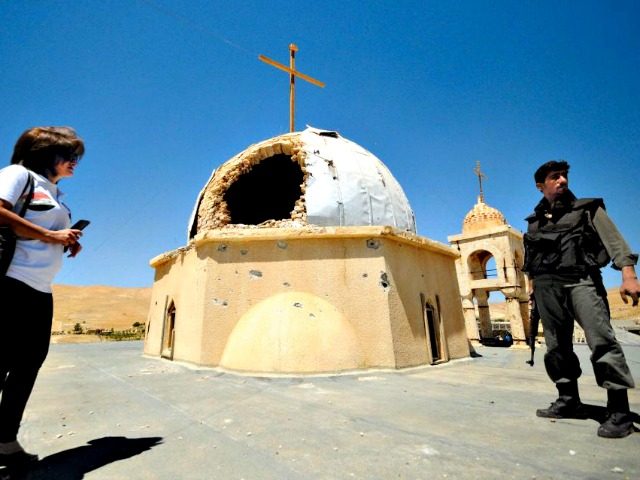Catholic News Service reported on Friday that two Catholic leaders in Syria are criticizing the U.S. attack on the Bashar al-Assad regime that took place on Thursday, claiming it will only assure the continuation of the bloody civil war in the country, with Christians perhaps suffering the most.
“It is a shame that the United States administration didn’t wait until an honest United Nations investigation was thoroughly made into what is said to be a chemical air strike in Khan Shaykun,” Syriac Catholic Patriarch Ignace Joseph Younan told CNS.
“The agglomerate media and the supremacist policy of the USA just want the killing and destroying conflict in Syria to continue, and this primarily to kill whatever attempt to resolve the bloody crisis,” the Syrian-born Younan told CNS. Younan also served for fourteen years as bishop of the New Jersey-based Diocese of Our Lady of Deliverance for Syriac Catholics in the United States and Canada.
Bishop Georges Khazen, who serves Latin-rite Catholics in Aleppo, agreed that there should have been an investigation as to who perpetrated the chemical weapon attack before any military response, telling the Rome-based Fides news agency that the U.S. action “opens new disturbing scenarios for all.”
The Pentagon confirmed the launch of 59 Tomahawk land attack missiles on Thursday night as a retaliatory move following what appeared to be a chemical attack on civilians in Idlib province.
“The strikes were intended to deter the regime from using chemical weapons again,” Pentagon Spokesman Navy Capt. Jeff Davis said.
Davis said the strikes hit aircraft, hardened aircraft shelters, petroleum and logistical storage areas, ammunition supply bunkers, and air defense systems and radars.
In a speech explaining his actions, Trump said, in part:
Tonight, I ordered a targeted military strike on the airfield in Syria from where a chemical attack was launched. It is in the vital, national security interest of the United States to prevent and deter the spread and use of deadly chemical weapons. There can be no dispute that Syria used banned chemical weapons, violated its obligations under the chemical weapons convention and ignored the urging of the U.N. Security Council.
We ask for God’s wisdom as we face the challenge of our very troubled world. We pray for the lives of the wounded and for the souls of those who have passed, and we hope that as long as America stands for justice, that peace and harmony will in the end prevail.
The criticism by Christians of the U.S. attack against the Assad regime reflects the complicated lives of believers in Syria and the contrast of their lives before and since the civil war.
In December 2016, the Economist wrote about Christians caught in the civil war in Syria, now entering its seventh year, in an article entitled, “Aleppo presents a moral dilemma for Christian leaders”:
The leaders of Syria’s local churches have generally looked to President Bashar al-Assad as their protector; and their feeling that only Mr Assad guarantees their lives has deepened as the conflict has polarized, with fundamentalist Sunni fighters, murderously hostile to all other faiths, on one side and government forces backed by Shia militias and Russian air power on the other. In this state of affairs, only the latter coalition seems to offer Christian churches any chance of prolonging their precarious existence. Many would say Mr Assad is to blame for bringing about that polarization; but to a bishop on Syria’s front-line, survival probably matters more than political analysis.
To defend Mr. Assad seems morally outrageous, but calls for his removal risk sounding like a death-knell for fellow Christians.
The Economist cited Father Jacques Mourad who survived five months of captivity at the hands of Islamic terrorists. He said that, while “Sunni extremism” is a threat to Christians, they are not the only threat.
“The U.S. has been bombing Syria and Iraq for years, and now the Russians are doing so, too,” Mourad said. “And what have they achieved? Have they stopped the terrorist violence?
“Absolutely not,” Mourad said.
The BBC provided a backdrop for the Christian dilemma in an article it published in February 2015.
The founder of the Baath Party, which has ruled Syria since 1963, was a Christian, and Christians rose to senior positions in the party, government and security forces, although they are generally not seen to have any real power compared with their Alawite and Sunni colleagues.
Although, like other Syrians, they had very limited civil and political freedoms, Christians are believed to have valued the rights and protection accorded to minorities by Hafez al-Assad, who was president between 1971 and 2000, and by his son Bashar.
According to the BBC, Patriarch Gregorios III Laham sent a statement to a Catholic charity saying, “The future of Christians in Syria is threatened not by Muslims but by… chaos… and the infiltration of uncontrollable fanatical, fundamentalist groups.”
“Patriarch Gregorios said the threat to Christianity in Syria had wider implications for the religion’s future in the Middle East because the country had for decades provided a refuge for Christians from neighboring Lebanon, Iraq and elsewhere,” the BBC reported.
Still, there is no guarantee of the survival of Christianity in the cradle of the faith.
One year ago, Chaldean bishop of Aleppo, Antoine Audo, said that the Christian population in Syria has been reduced by two-thirds in five years — from 1.5 million to only 500,000.
Speaking at a press conference at the UN headquarters in Geneva, Audo said that the situation in Aleppo is even worse than in the rest of Syria where the Christian population had fallen from 160,000 to 40,000.

COMMENTS
Please let us know if you're having issues with commenting.